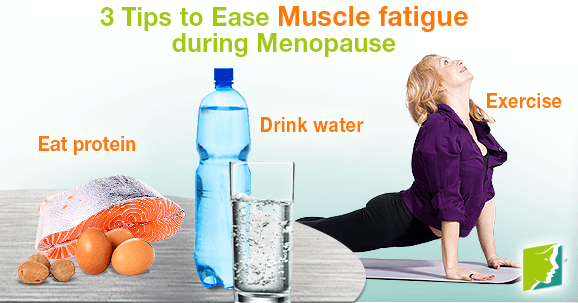Muscle fatigue is defined as an inability of the muscles to generate adequate force. There are a number of reasons for this, including natural estrogen decline and various lifestyle factors. The condition can make life difficult, as the sufferer will find it much harder than normal to perform simple tasks, such as getting out of a chair. Menopausal muscle fatigue has a few possible contributing factors, and these might work alone or overlap. Keep reading for more information about the causes of muscle fatigue and tips to ease it.
Causes of Menopausal Muscle Fatigue
During menopause, muscle fatigue can result from a combination of factors. These most commonly include:
Natural hormone decline
Estrogen and progesterone play a chief role in maintaining muscle mass and strength. Therefore, with the natural decline in production of female sex hormones comes a reduction in muscle strength. On average, after menopause there is a 0.6% annual loss in muscle mass.
Stress
Free radicals are molecules that can cause damage to the body. Without antioxidants to rid the body of these compounds, the body is unable to repair the damage done as efficiently. Therefore, when they affect muscle, the body might not be able to replenish the muscle mass lost as quickly, so muscle fatigue is a natural consequence.
Lifestyle
It is often the case that as women get older, their lifestyles become much more sedentary, and lack of use can cause muscles to weaken. This is part of the reason muscle fatigue most often occurs in women of menopausal age.
Steps to Ease Muscle Fatigue during Menopause
Many women might feel despondent and powerless with regards to muscle fatigue during menopause, but the truth is, it can be controlled. Read on to learn more about the best ways to treat menopausal muscle fatigue.
Eat protein
The amino acids that make up protein are a key component in muscle tissue. Therefore, the diet needs to be high in protein in order to replenish the muscle mass that is naturally lost. Older adults seem to be the most at risk group for not consuming enough protein, but this is easily countered. A diet with plenty of protein-rich foods, such as eggs, fish, and nuts will reduce loss of muscle mass and thereby ease muscle fatigue. Read on vitamins and supplements for muscle fatigue.
Drink water
Water comprises about 70% of the human body, and so all aspects of health rely on being hydrated. Therefore, drinking plenty of water will keep the muscles functioning at their optimum efficiency. In fact, studies have shown that athletes cannot train as long or as hard when they are partially dehydrated.
Exercise
Muscles rely on use to keep them strong, so a lack of physical activity will weaken them and mean that the body has to exert more energy when they are in use. In people with a less active lifestyle, using the muscles for smaller tasks can result in a bigger expenditure of energy, and the stamina of the muscles is greatly reduced. Read on relaxing activities that help reduce muscle fatigue.
Muscle fatigue is a very undesirable symptom of menopause, but can be avoided or remedied. Lifestyle changes are the safest, cheapest, and healthiest route to take, so they ideally should be the first resort. If you find the muscle fatigue is not waning after a few weeks of implementing healthy lifestyle changes, then talk to a doctor, who will be able to recommend other treatments to complement healthy habits.
Sources
- Betteridge, D.J. (2000). What is oxidative stress? Metabolism, 49(2 Suppl 1), 3-8. Retrieved from http://www.ncbi.nlm.nih.gov/pubmed/10693912
- Judelson, D.A. et al. (2007). Hydration and muscular performance: does fluid balance affect strength, power and high-intensity endurance? Sports medicine, 37(10), 907-921. Retrieved from http://www.ncbi.nlm.nih.gov/pubmed/17887814
- Maltais, M.L. et al. (2009). Changes in muscle mass and strength after menopause. Journal of the International Society of Musculoskeletal and Neuronal Interactions, 9(4), 186-197. Retrieved from http://www.ismni.org/jmni/pdf/38/02MALTAIS.pdf
- National Institutes of Health. (2008). Making and Maintaining Muscle: How Much Protein Do You Need? Retrieved September 30, 2014, from http://newsinhealth.nih.gov/2008/March/docs/01features_01.htm



